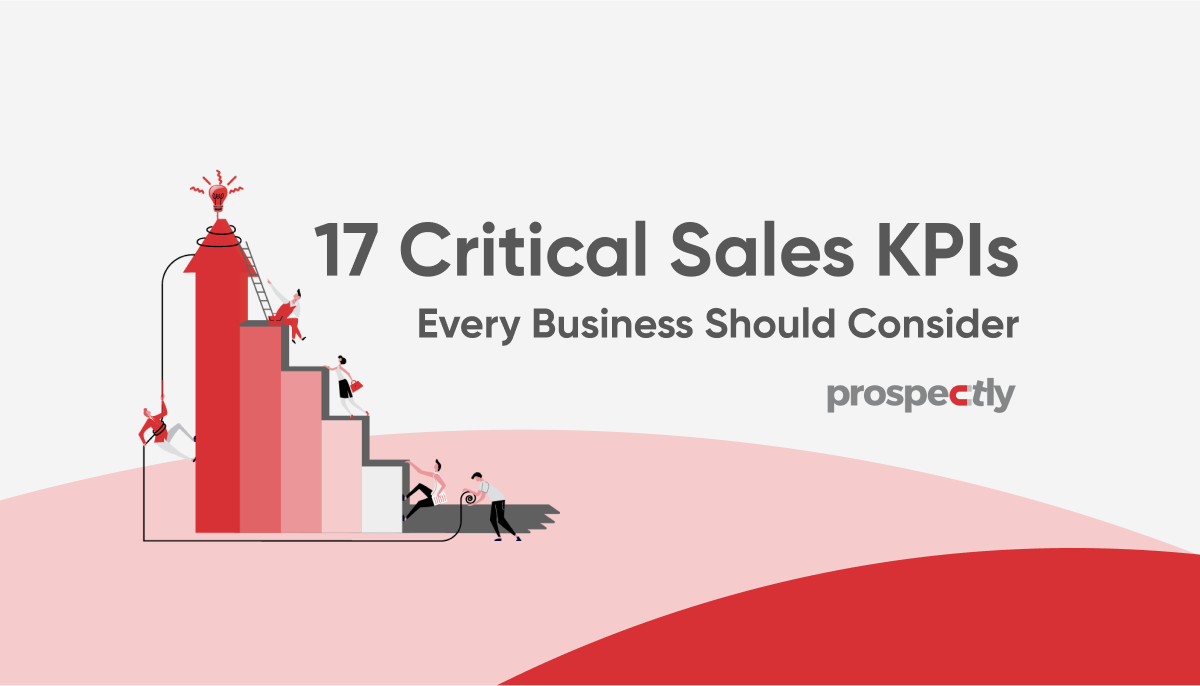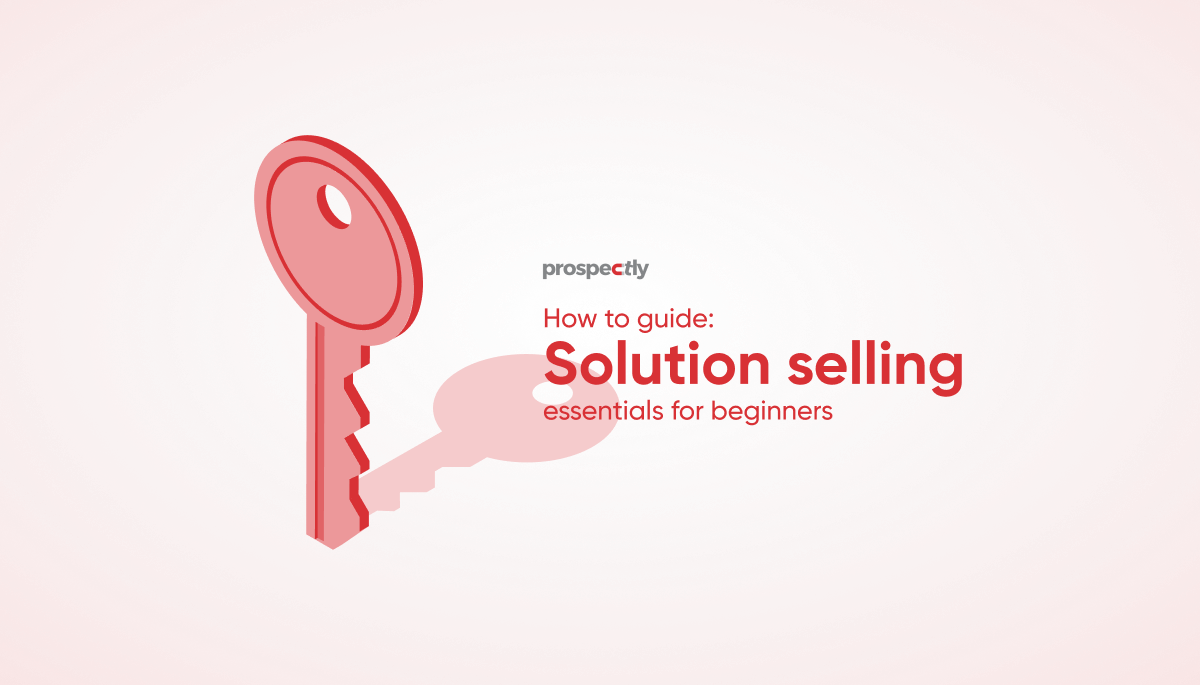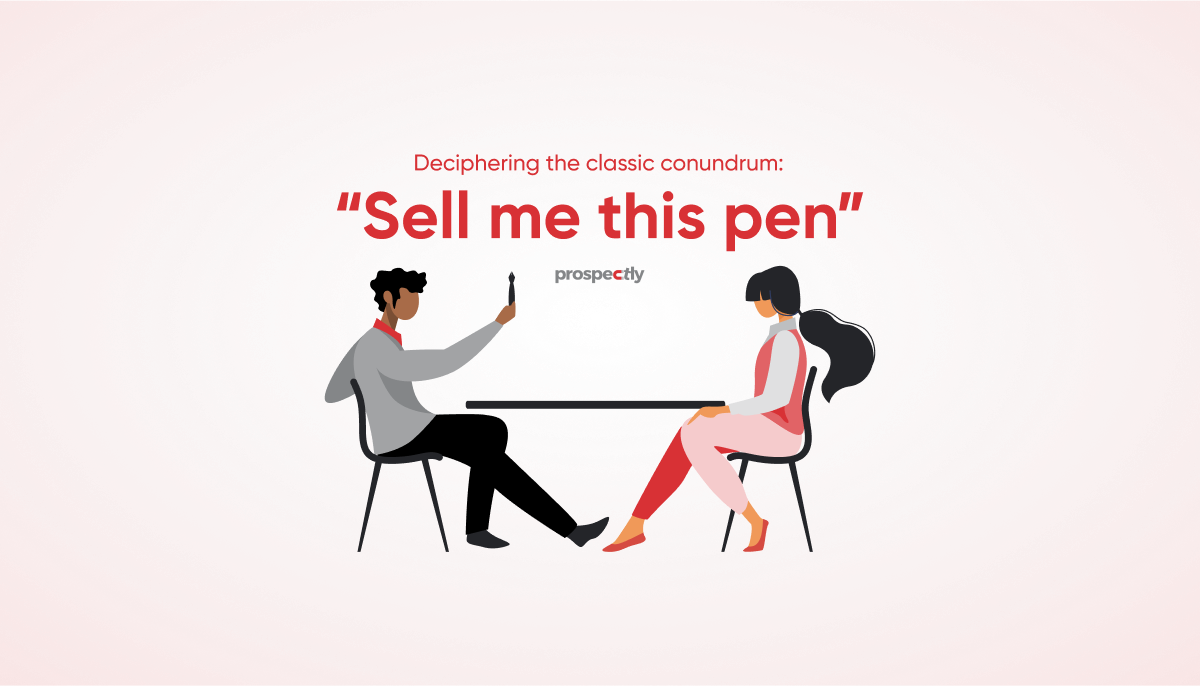The compelling impact of artificial intelligence in sales
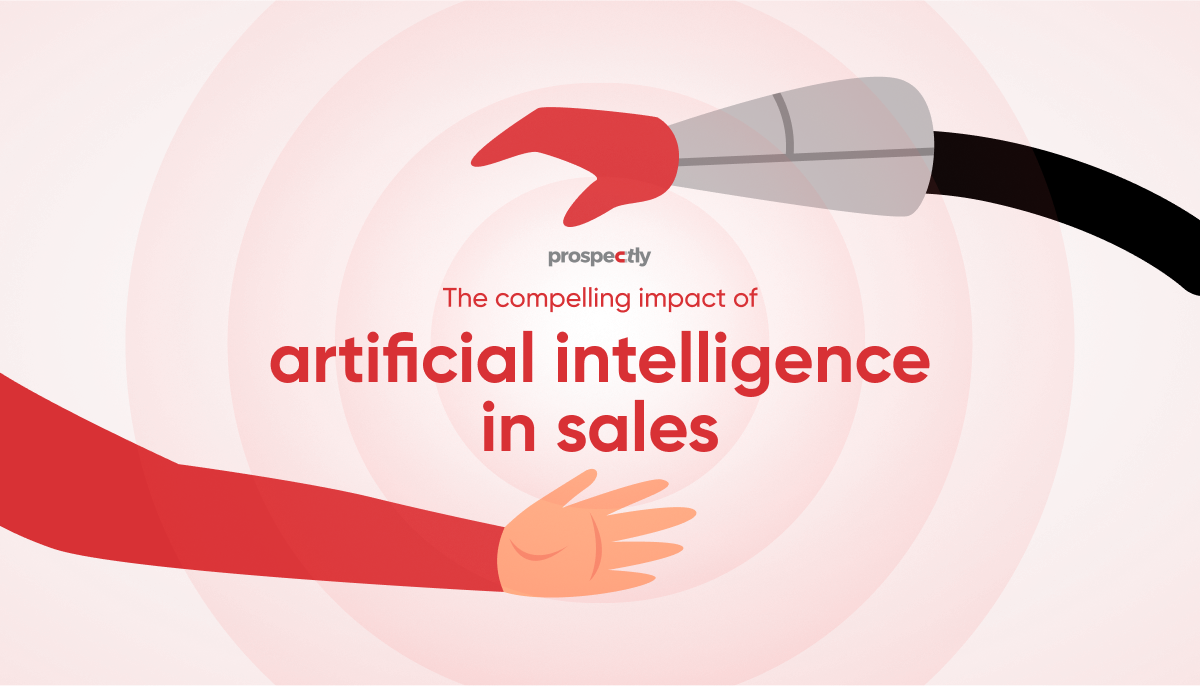
As stated by the legendary science fiction writer, Chen Qiufan in AI 2041, “humans’ search for artificial intelligence has persisted throughout world history, long before computer science existed as a field or the term AI entered the lexicon”. Over the last few years, AI has made insurmountable breakthroughs and essentially become a core driver for the fourth industrial revolution.
But, how do we define AI? Artificial intelligence is an amalgamation of several unique smart technologies like NLP (Natural Language Processing), ML (Machine Learning), Computer vision, Deep learning, etc. Hence, it becomes an arduous task to come up with a fitting definition.
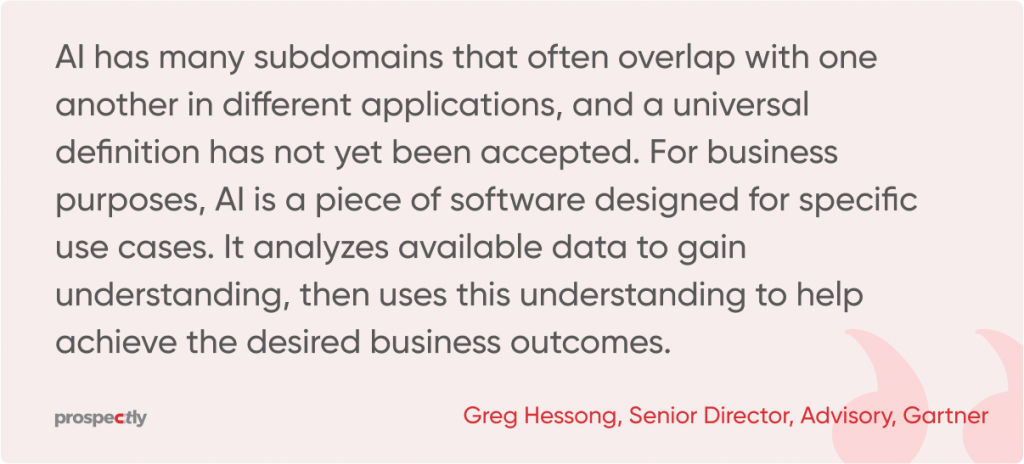
Like most business functions, AI has also gained prominence in the world of sales. According to Mckinsey’s State of AI surveys from 2020 and 2021, Sales and Marketing is one of the three business functions where AI adoption is most common. But what exactly can artificial intelligence do for sales? Is artificial intelligence the future of sales? This blog will shed light on AI’s predominant role in your sales career.
What is artificial intelligence in sales?
Our blog on social selling outlines that sales is an organic human activity fostered by person-to-person interactions. However, the rapidly developing capability of AI in mimicking human intelligence has proved to be an essential component in enhancing sales processes, decoding complex sales challenges, and elevating sales teams’ performance. AI in sales means utilizing this marvelous technology not only for everyday sales operational tasks but also for the cognitive ones, making you stand out as an outstanding salesperson.
How can artificial intelligence boost sales?
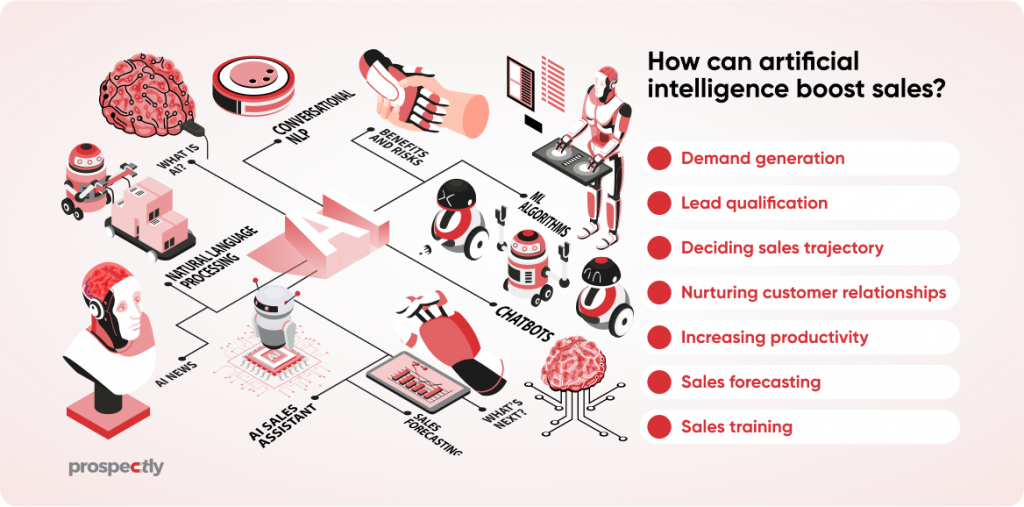
Artificial intelligence has transformed conventional human-centric sales by automating various sales process stages. For instance, AI technology like ML can recommend the right targets and predict your sales numbers. By constantly assessing its own performance, it can give you the tools to increase your sales exponentially.
Let’s look at some of the benefits of AI in sales.
Demand generation
This is probably the most time-consuming part of the sales cycle. AI drastically cuts down manual effort by-
- Helping you pinpoint new prospect markets from known characteristics of known segments.
- Optimizing target territory based on geographic account and product data.
- Offering relationship intelligence by identifying and suggesting relevant contacts within your social network
Lead qualification
You usually undergo the grueling exercise of scouting the right prospects and then manually qualifying each lead. Also, most of this work is often speculative, based on previous success stories.
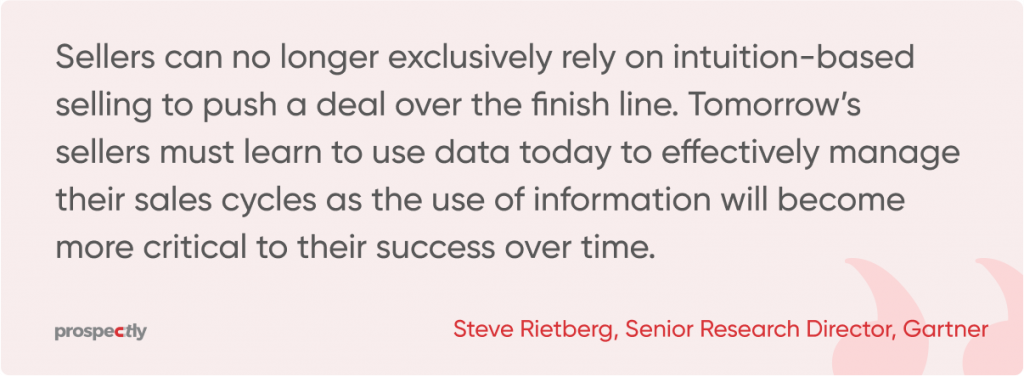
Artificial intelligence takes the guesswork out of lead qualification as it can compile and coordinate data across several platforms, like procuring your client’s historical information from social media and even records of your client interactions from emails, messages, etc. By analyzing this data, AI can make intelligent connections and help you find the best prospective customer.
Deciding sales trajectory
Artificial intelligence uses optimization techniques to anticipate your best course of action when a given situation requires tradeoffs between objectives and constraints. This may be determining the optimal pricing for every deal or using ML to suggest upselling and cross-selling opportunities.
Nurturing customer relationships
Artificial intelligence can assist you in building long-term client relationships in the following ways-
- By using ML algorithms, AI recommends personalized tools and content to share with your clients. Based on the current news feed, it also offers curated information about your clients.
- AI models can provide you with relevant content to manage customer requests, better and faster.
- NLP helps in customer sentiment analysis which can guide you in client conversations.
- AI tech analyzes customer lifetime value by reviewing customer health scores for churn rate, upselling, etc.
Increasing productivity
Although your end goal as a salesperson is to bring in more customers; you also need to power through several operational tasks throughout your workday. According to Mckinsey, “B2B sales teams willing to shake up their sales models and embrace next-gen capabilities are growing revenue at twice the rate of GDP”. Here are some ways in which artificial intelligence can remove the redundancy from your daily schedule and leave you bandwidth for what matters most, i.e., closing more sales.
- AI can streamline and automate your routine customer conversations. AI assistants or chatbots use conversational NLP to interact with inbound leads. It addresses customer queries by scanning multiple complex documents faster than humans.
- AI technology can compose basic emails similar to human interactions and are also far more accurate.
- It assists in maneuvering your day-to-day tasks like managing your calendar, scheduling meetings, analyzing your sales pipeline, etc.
- By leveraging SPA (Smart Process Automation) and ML, you can automate higher-order tasks that require much more complex reasoning to process.
Sales forecasting
By identifying the factors that influence a given outcome, AI uses predictive modeling to project various sales outcomes. Some of them are –
- Determining your ICP (Ideal Customer Profile)
- Predicting win probabilities by sale stages, and identifying the leads with maximum closing potential
- Forecasting your/sale team’s performance based on factual data and seasonalities
Sales training
Artificial intelligence has revolutionized the sales training industry. AI-guided selling can help you augment your product/industry knowledge, identify your activities that drive deals, and also help you focus on honing the skills that need more work. Rather than basic sales skills, AI-based sales training focuses more on critical thinking, primarily in data literacy. To keep up with current developments in AI, sales training models will need to incorporate the usage of AI/ML sales tools in daily sales operations.
Related: Turn your sales coaching into a high-performing machine
3 Practical tips for integrating AI into your current sales process

Build a solid foundation
Though the advantages of using AI for sales are exemplary, do not adopt technology just for the sake of it. Using any form of tech requires you to understand the basic functionality to maximize its potential. Do your research and get a general sense of the key terminologies.
Experiment with AI
Identify the sales activities and high-priority outcomes unique to your business. Map out areas where you might have inefficiencies and spend some time evaluating suitable options. Most AI vendors offer free trials, which help you get acquainted and decide the best course of action to address any gaps in your sales process.
Evaluate consistently
After you have onboarded a new AI system and used it for some time, do not forget to assess your decision. We live in a dynamic world where technology or business requirement keeps changing. Determine if your tech is still adding value and look for replacements if you feel otherwise.
Best AI sales assistant tools
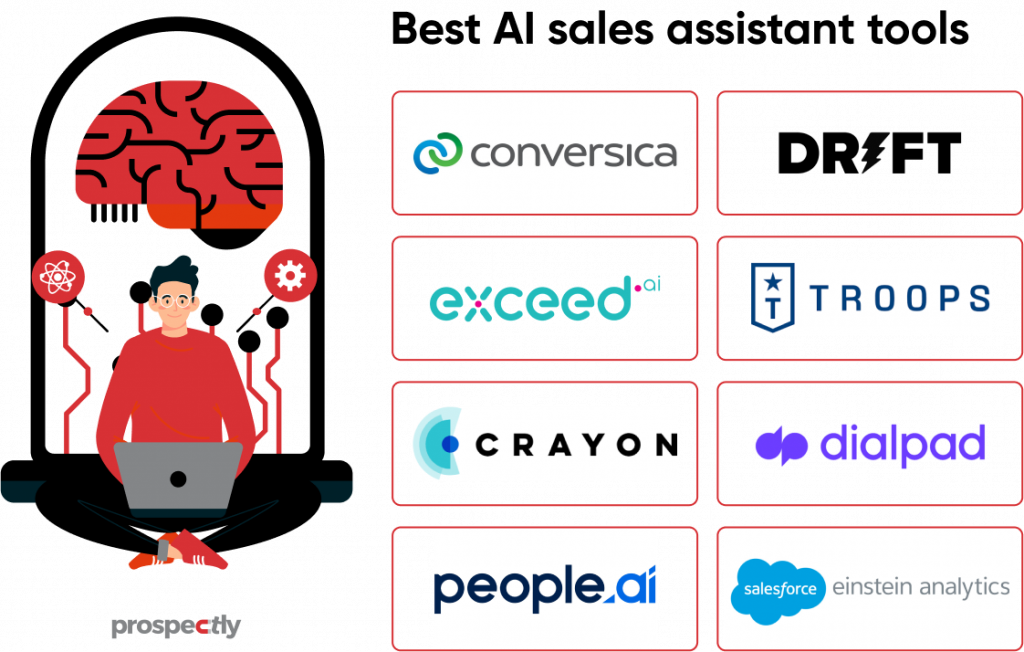
Now that you have understood how to incorporate AI into your sales process, here’s a list of some of the best AI tools for the sales function, in no particular order.
Conversica– Its automated AI sales assistant pre-qualifies a lead before you move it down your sales funnel. It saves you a lot of time and ensures you interact with only the leads genuinely interested in your offering.
Drift – Drift helps companies engage in real-time, personalized conversations with the right customers at the right time. Its revenue acceleration platform is built on the foundation of conversational marketing and conversational sales.
Exceed.ai – Its AI assistant engages qualified leads with human-like two-way conversations over email, website chat, and SMS. Once these leads are ready to talk to sales, the assistant will loop you in to book a meeting or demo.
Troops – Troops is a revenue communications platform designed with humans in mind. It alerts sales teams with real-time revenue signals allowing them to take rapid action, share intelligence and decide better.
Crayon – Crayon’s competitive intelligence software offers you competitive analysis by tracking millions of data sources. It provides data based on real-time and historical insights to identify trends and opportunities.
Dialpad Sell – Its AI-powered sales dialler provides intelligence and helps sales reps close more deals. Dialpad uses voice intelligence technology and CRM integration in a best-of-breed communications solution.
People.ai – People.ai is an enterprise revenue platform that helps uncover revenue opportunities from your customers. It automates data entry, boosts productivity, and provides actionable intelligence across all management tools.
Salesforce Einstein – Salesforce’s AI tech Einstein is a sales assistant that empowers you to empathize with customers, increases your productivity, and supersede customer experience. It offers customer insights based on past interactions that help prioritize leads, cases, and campaigns
Circumventing the gray areas in artificial intelligence

The challenges in using artificial intelligence for sales are often due to the inability to understand the tech and setting unrealistic expectations. As stated by Gartner, steer clear of these common oversights while integrating AI into your sales process.
- Without giving in to the hype develop a clear understanding of the capabilities of the technology you choose. This will help you set realistic expectations.
- Conduct an extensive review of potential use cases by assessing how and to what extent artificial intelligence can enhance target sales outcomes for your company’s distinctive needs.
- Focus on a specific set of clearly defined use cases, improve the quality of your data used by AI tools and prioritize your technical upskilling.
Is artificial intelligence the future of sales?
By now, you would have realized that AI is no longer part of sci-fi lingo and has real-world use cases in the sales domain. Gartner predicts that 75% of B2B companies will utilize AI-guided selling solutions by 2025. Moreover, according to its 2021 CSO Priorities Pulse Survey, CSOs (Chief Sales Officers) have already invested or are considering investing in AI tools.
From helping you study your target market, identifying your potential customers, optimizing your pricing options, forecasting your revenue, and enhancing post-sales interactions with real-time customer intel, you can apply to every stage of the sales process. Although we are yet to explore the full potential of artificial intelligence in the sales function, the future of selling would be primarily about automating the mundane and helping you prioritize the human aspect of sales.
